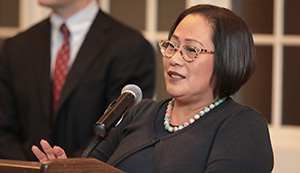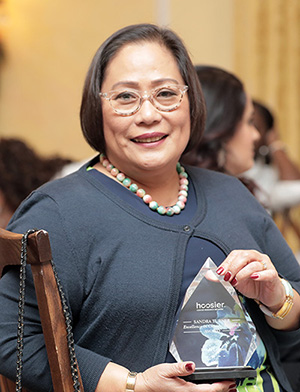Loman receives Sandra Turner Excellence in Clinical Research Award

Cancer research, as complex and technical an endeavor as it is, involves real people, and no matter what resources are expended, it is the human element that sustains it and propels it forward. HCRN annually recognizes individuals who have demonstrated outstanding commitment to cancer research, patient care, and advocacy.
At a recent event, HCRN honored Rhoda Loman, clinical research specialist at the Indiana University Melvin and Bren Simon Cancer Center, with the 2017 Sandra Turner Excellence in Clinical Research Award. The award was established in 2002 by HCRN co-founder William B. Fisher, MD, through the George and Sarah Jane Fisher Fund to honor the memory of Sandra Turner, HCRN’s first executive director. The award is given to those who exemplify the qualities Turner possessed and respected in others, such as sustained professional commitment, contribution to the progress of oncology care, and the unflinching touch of compassion.
Loman’s interest in medicine goes back to her formative years. “My Mom,” Loman said. “When she got sick, I was 13, so I was very young. I had so many questions.”
Loman received a Bachelor of Science degree in medical technology at Centro Escolar University in the Philippines in 1980. She joined Indiana University School of Medicine as a clinical research specialist for the Department of Urology in 2002.
Her initiation role in Urology was “all-in,” Loman recalled. “I was the coordinator and did everything starting from when the PI decides to do a clinical trial, to budget negotiations, executing contracts to seeing patients, and even some of the clinical portion, (retrieving conmeds, AEs etc).”
In January 2011, Loman moved to the IU Simon Cancer Center’s Clinical Trials Office. Her transition from urology to oncology was natural. “While in Urology, I had worked on some cancer trials and had dealt with cancer patients,” Loman said. “Like prostate cancer for examples, we did device studies and also started doing some of the prostate cancer and bladder cancer studies.”
oncology was natural. “While in Urology, I had worked on some cancer trials and had dealt with cancer patients,” Loman said. “Like prostate cancer for examples, we did device studies and also started doing some of the prostate cancer and bladder cancer studies.”
Through these experiences, Loman’s interest in oncology surfaced. “More and more, I wanted to do the cancer studies more so than I wanted Urology studies, so it was an easy transition for me to when I moved to the Clinical Trials Office.”
Loman’s motivation to contribute to cancer research is more than professional; it is personal. “My mother died of ovarian cancer, and my sister is getting into the late stage of ovarian cancer as well,” Loman said. “It is close to my heart, because of my family background.”
Her passion sustains her on her journey to advance cancer care. “Being a Research Specialist, I find that there is no boring day; every day is new. There is so much to learn about cancer. I like that challenge,” Loman said. “You learn every day, you work through medical records and if there is anything in question, you research it and try to find answers. Asking your PI, Research nurse and your team for answers along the way. Each patient experience gives you knowledge.”
At the Clinical Trials Office, Loman focuses on genitourinary studies, mainly in prostate and bladder cancer. On a daily basis, she makes behind-the-scenes contributions that move research forward. “We do start up and close out of clinical trials, patient eligibility, medical history, enrollment/registration, data entry, and a bit of regulatory.”
Despite having moved on from Urology, the impact of her compassion persists. “Some of the trials we have are survival studies, so you follow these patients for a long time and you get to know the family. There are Urology survivor patients from many years ago that still come to my office to see me,” she said. “I’ve had patients that were in hospice and when I can I try to visit to say goodbye. I miss the patient interaction.”
Loman is a proactive force in research. “I always like to meet with the HCRN monitor at the end of the monitoring visits — the last two, maybe three hours of the last day of the visit. I sit with them and try to reconcile all queries. I want it done before the monitor leaves.”
Loman has worked with HCRN since 2011 and enjoys the relationships she has developed with staff. “I love working with this group; I always have,” she said.
About Hoosier Cancer Research Network:
Hoosier Cancer Research Network (formerly known as Hoosier Oncology Group) conducts innovative cancer research in collaboration with academic and community physicians and scientists across the United States. The organization provides comprehensive clinical trial management and support, from conception through publication. Created in 1984 as a program of the Walther Cancer Institute, Hoosier Cancer Research Network became an independent nonprofit clinical research organization in 2007. Since its founding, Hoosier Cancer Research Network has conducted more than 180 trials in a variety of cancer types and supportive care, resulting in more than 350 publications. More than 7,500 subjects have participated in Hoosier Cancer Research Network clinical trials.

Facebook
Hoosier Cancer Research Network on Facebook
Linked In
You Tube
Twitter